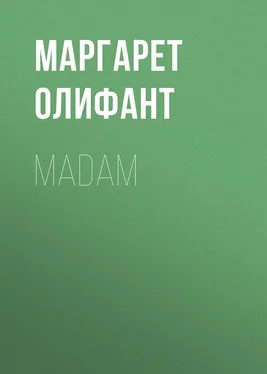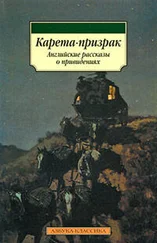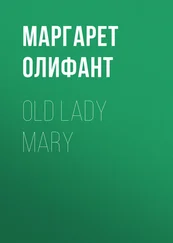Маргарет Олифант - Madam
Здесь есть возможность читать онлайн «Маргарет Олифант - Madam» — ознакомительный отрывок электронной книги совершенно бесплатно, а после прочтения отрывка купить полную версию. В некоторых случаях можно слушать аудио, скачать через торрент в формате fb2 и присутствует краткое содержание. Жанр: foreign_prose, literature_19, foreign_antique, на английском языке. Описание произведения, (предисловие) а так же отзывы посетителей доступны на портале библиотеки ЛибКат.
- Название:Madam
- Автор:
- Жанр:
- Год:неизвестен
- ISBN:нет данных
- Рейтинг книги:5 / 5. Голосов: 1
-
Избранное:Добавить в избранное
- Отзывы:
-
Ваша оценка:
- 100
- 1
- 2
- 3
- 4
- 5
Madam: краткое содержание, описание и аннотация
Предлагаем к чтению аннотацию, описание, краткое содержание или предисловие (зависит от того, что написал сам автор книги «Madam»). Если вы не нашли необходимую информацию о книге — напишите в комментариях, мы постараемся отыскать её.
Madam — читать онлайн ознакомительный отрывок
Ниже представлен текст книги, разбитый по страницам. Система сохранения места последней прочитанной страницы, позволяет с удобством читать онлайн бесплатно книгу «Madam», без необходимости каждый раз заново искать на чём Вы остановились. Поставьте закладку, и сможете в любой момент перейти на страницу, на которой закончили чтение.
Интервал:
Закладка:
Then terror seized her. Mr. Trevanion was propped up in his bed, a pair of fiery, twinkling eyes, full of the suspicion and curiosity that were natural to him, peering out of the skeleton head, which was ghastly with illness and emaciation. Nothing escaped the fierce vitality of those eyes. He saw the movement of the door, the sudden apparition of the excited face, at first so eager and curious, then blanched with terror. He was himself comparatively at ease, in a moment of vacancy in which there was neither present suffering enough to occupy him, nor anything else to amuse his restless soul. “Hallo!” he cried, as soon as he saw her; “come in—come in. You have got something more to tell me? Faithful woman—faithful to your master! Come in; there is just time before Madam comes back to hear what you have to say.”
“I beg your pardon, sir,” said the valet, who had taken Madam’s place, “but the doctor’s orders is—”
“What do I care for the doctor’s orders? Get out of the way and let Russell in. Here, woman, you have got news for me. A faithful servant, who won’t conceal from her master what he ought to know. Out, Jenkins, and let the woman come in.”
He raised himself up higher in his bed; the keen angles of his knees seemed to rise to his chin. He waved impatiently his skeleton hands. The valet made wild signs at the intruder. “Can’t you go away? You’ll kill him!” he cried in a hoarse whisper. “Come in—come in!” shrieked the skeleton in the bed, in all the excitement of opposition. Then it was that Russell, terrified, helpless, distracted, gave that cry which echoed through all the house, and brought Dr. Beaton rushing from one side and Mrs. Trevanion from the other. The woman had fallen at the door of the room in hysterics, as Jane said, a seizure for which all the attendants, absorbed in a more immediate danger, felt the highest contempt. She was pushed out of the way, to be succored by the maids, who had been brought by the cry into the adjacent passage, in high excitement to know what was going on. But Russell could not throw any light upon what had happened even when she came to herself. She could only sob and cry, with starts of nervous panic. She had done nothing, and yet what had she done? She had not said a word to him, and yet— It was soon understood throughout all the house that Mr. Trevanion had another of his attacks, and that Dr. Beaton did not think he could ever rally again.
The room where the patient lay was very large and open. It had once been the billiard-room of the house, and had been prepared for him when it was found no longer expedient that he should go up and down even the easy, luxuriously carpeted stairs of Highcourt. There was one large window filling almost one side of the room, without curtains or even blind, and which was now thrown open to admit the air fully. The door, too, was open, and the draught of fresh, cold, wintry air blowing through made it more like a hillside than a room in a sheltered house. Notwithstanding this, Mrs. Trevanion stood by the bed, waving a large fan, to get more air into the panting and struggling lungs. On the other side of the bed the doctor stood, with the bony wrist of the patient in his warm, living grasp. It seemed to be Death in person with whom these anxious ministrants were struggling, rather than a dying man. Other figures flitted about in the background, Jane bringing, with noiseless understanding, according to the signs the doctor made to her, the things he wanted—now a spoonful of stimulant, now water to moisten his lips. Dead silence reigned in the room; the wind blew through, fluttering a bit of paper on the table; the slight beat of the fan kept a vibration in the air. Into this terrible scene Rosalind stole trembling, and after her her uncle; they shivered with the chill blast which swept over the others unnoticed, and still more with the sight of the gasping and struggle. Rosalind, unused to suffering, hid her face in her hands. She could do nothing. Jane, who knew what was wanted, was of more use than she. She stood timidly at the foot of the bed, now looking up for a moment at what she could see of her dying father, now at the figure of his wife against the light, never intermitting for a moment her dreadful, monotonous exercise. Mr. Trevanion was seated almost upright in the midst of his pillows, laboring in that last terrible struggle for breath, for death, not for life.
He had cried out at first in broken gasps for “The woman—the woman! She’s got something—to tell me. Something more—to tell me. I’ll hear it— I’ll he-ar it— I’ll know—everything!” he now shrieked, waving his skeleton arms to keep them away, and struggling to rise. But these efforts soon gave way to the helplessness of nature. His cries soon sank into a hoarse moaning, his struggles to an occasional wave with his arms towards the door, an appeal with his eyes to the doctor, who stood over him inexorable. Every agitating movement had dropped before Rosalind came in into the one grand effort for breath. That was all that was left him in this world to struggle for. A man of so many passions, who had got everything he had set his heart on in life: a little breath now, which the November breeze, the winnowing of the air by the great fan, every aid that could be used, could not bring to his panting lungs. Who can describe the moment when nurses and watchers, and children and lovers stand thus awed and silent, seeing the struggle turn into a fight for death—not against it: feeling their own hearts turn, and their prayers, to that which hitherto they have been resisting with all that love and skill and patience can do? Nature is strong at such a time. Few remember that the central figure has been an unkind husband, a careless father; they remember only that he is going away from them into darkness unfathomable, which they can never penetrate till they follow; that he is theirs, but soon will be theirs no more.
Then there occurred a little pause; for the first moment Dr. Beaton, with a lifted finger and eyes suddenly turned upon the others, was about to say, “All is over,” when a faintly renewed throb of the dying pulse under his finger contradicted him. There was a dead calm for a few moments, and then a faint rally. The feverish, eager eyes, starting out of their sockets, seemed to calm, and glance with something like a dim perception at John Trevanion and Rosalind, who approached. Rosalind, entirely overcome by emotion and the terrible excitement of witnessing such an event, dropped down on her knees by the bedside, where with a slight flickering of the eyelids her father’s look seemed to follow her. But in the act that look was arrested by the form of his wife, standing always in the same position, waving the fan, sending wafts of air to him, the last and only thing he now wanted. His eyes steadied then with a certain meaning in them—a last gleam which gradually strengthened. He looked at her fixedly, with what in a person less exhausted would have been a wave of the hand towards her. Then there was a faint movement of the lips. “John!” was it perhaps? or “Look!” Then the words became more audible. “She’s—good nurse—faithful— Air!—stands—hours—but—” Then the look softened a little, the voice grew stronger; “I’m—almost—sorry—” it said.
For what—for what? In the intense stillness every feeble syllable was heard. Only a minute or two more was left to make amends for the cruelty of a life. The spectators held their breath. As for the wife, whose life perhaps hung upon these syllables as much as his did, she never moved or spoke, but went on fanning, fanning, supplying to him these last billows of air for which he labored. Suddenly a change came over the dying face, the eyes with all their old eagerness turned to the doctor, asking pitifully—was it for help in the last miserable strain of nature, this terrible effort to die?
Читать дальшеИнтервал:
Закладка:
Похожие книги на «Madam»
Представляем Вашему вниманию похожие книги на «Madam» списком для выбора. Мы отобрали схожую по названию и смыслу литературу в надежде предоставить читателям больше вариантов отыскать новые, интересные, ещё непрочитанные произведения.
Обсуждение, отзывы о книге «Madam» и просто собственные мнения читателей. Оставьте ваши комментарии, напишите, что Вы думаете о произведении, его смысле или главных героях. Укажите что конкретно понравилось, а что нет, и почему Вы так считаете.












